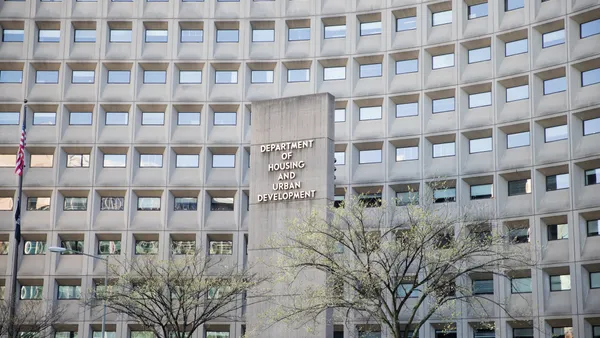Dive Brief:
- Google's new mega-campus in San Jose could cause rents to soar unless the company commits significant money to affordable housing production, according to a report from San Jose-based community organization Working Partnerships USA. It estimates renters collectively could pay up to $235 million more each year.
- The company and city will need to create more than 17,700 new housing units, of which nearly 5,300 would have to be priced below market rate.
- The report offers recommendations for how Google and the city of San Jose can pursue inclusive tech development without affecting other citizens' ability to live and thrive there. For example, Google and the city could create an agreement that includes passing a linkage fee, requiring Google to contribute to affordable housing creation and preservation, passing an incentive zoning policy and passing a policy to allow tenants facing eviction a right to legal counsel.
Dive Insight:
San Jose, positioned at the heart of Silicon Valley, already has been experiencing a housing crunch from the influx of tech workers. The city lies within Santa Clara County, which has grown by about 230,000 workers since 2010, yet the county has only added about 6,500 homes per year in that time, the report says. Therefore housing growth (5.7%) did not keep pace with job growth (28.8%). The new downtown San Jose Google campus is expected to bring an extra 28,000 workers to the area.
In the third quarter of 2018, the region's median home price was $1.2 million and median apartment rent was $2,680 a month, with half of all prices falling below that marker. Rent has risen three times faster than wages from 2010 to 2017. This has resulted in 42% of Santa Clara County residents becoming rent burdened, or spending more than 30% of their income on affordable rent.
More than 34% of the county's neighborhoods are experiencing displacement and/or gentrification, in which longtime residents are forced out because they can't afford to live there anymore. This often involves wealthy citizens moving in while lower-income citizens are pushed out. Renters of color are hit the hardest.
The report suggests that its recommendations can serve as an opportunity to create a framework for development without resident displacement in the future. Seattle is another affordable housing strapped city closely watching this factor and Mayor Jenny Durkan presented affordable housing and anti-displacement legislation to the city council for consideration.
The region also has suffered from growing "super commutes," meaning workers who commute more than 90 minutes each way. This worsens as employees move farther away from the city center to find greater affordability. Super commutes have increased 231% in the San Jose metro area since 2005.
The report does not assess the effects Google's other existing and anticipated campuses in the region will have, only the downtown San Jose campus. The report also clarifies that Google is not the only company to have this effect on housing. However, it points out the city has provided Google with unique opportunities such as access to public lands, amended land uses and access to new transit investments, so citizens should hold higher expectations for this company in terms of responsible development.
The report acknowledges that San Jose leaders have taken steps to address affordable housing. In 2017, Mayor Sam Liccardo put forth the goal of building 22,000 new housing units — 10,000 below market rate — by 2022. However, the city is dealing with a shortage of resources to succeed in reaching that goal, much less in accommodating the additional need created by Google's new campus. The report calls on not only Google but also the city to take further measures to ease citizens' housing burden.
Other large companies, especially tech companies, have come under fire in recent years for their contribution to the widening affordable housing crisis. These companies increasingly are making contributions to help the problem and mitigate homelessness. Last week, Amazon announced it would donate a collective $8 million to mitigate homelessness in its two headquarter regions of Seattle and Arlington, VA.











